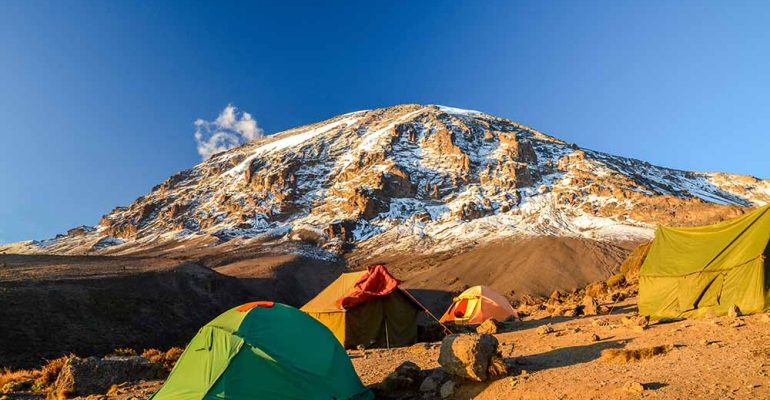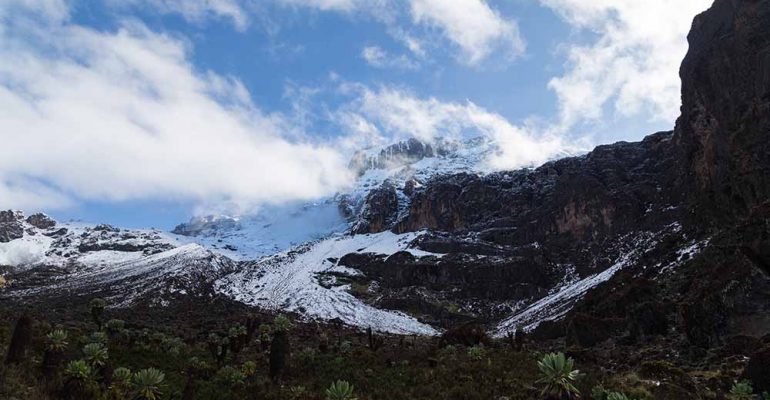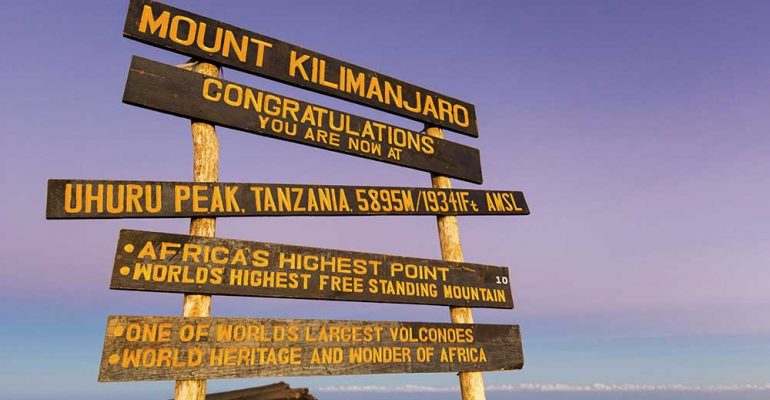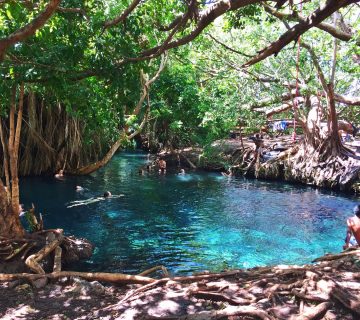



Route description:
Umbwe Route is arguably the least frequented on Kilimanjaro. Starting at the tropical rainforest it runs along Machame Route, joining it at Barranco Camp (3800m). The shortest of the routes, Umbwe – with its steep climb and short acclimatization periods – is amongst the most taxing on Kilimanjaro, while still showing off the beauties of the mountain terrain with its different habitat zones and panoramic views. While the camps along Umbwe Route to Uhuru Peak are well suited to acclimatization, this is still one of the more challenging ways to climb Kilimanjaro.
Previous climbing experience is, therefore, highly recommended for climbers contemplating taking Umbwe Route on the way to the highest point in Africa.
Arrival: Airport to Hotel
Arrival at Kilimanjaro International Airport (JRO), where you will meet our representative, and transfer to the hotel under the rate. The hotel will provide all the essentials for a comfortable stay: cozy rooms, hot water, polite staff, a swimming pool, and Internet access. In the evening there will be a briefing with our managers, who will also make sure you are ready to begin the climb.
Day 1: Trekking from Umbwe Gate to Umbwe Camp
Your guide and climb support crew arrive at your hotel in the morning. Introductions and a last brief equipment check precede your drive to the Umbwe Gate of Kilimanjaro National Park. This entrance, situated at 1,640 m above sea level, is where your trek starts. The head-guide will finalize the permits and registration for search and rescue services.
Your first day trekking is meant to bring you to Umbwe Camp for your first mountain overnight. Climbing up to 2,930 m is a long haul with a significant increase in altitude, so find the right pace for the whole group and stick with it. As this part of Umbwe route goes through rainforest with its probability of rain showers- do not forget your raincoat. Your support crew will have prepared the camp and dinner by the time you get there.
This being the group’s first night at this elevation, we recommend that you follow the below rules from here on:
- Do not consume any alcohol and minimize your caffeine intake
- Drinking no less than 4 liters of water per day is a good way to keep your-self hydrated. Take it in small amounts but frequently
- We encourage our clients to use Diamox in the mornings prior to the day’s climb. This reduces altitude sickness symptoms. Consult your doctor on the use of Diamox before leaving home on this trip.
Nightly discomfort often accompanies acclimatization. However, while such symptoms as headaches and nausea are common, make sure you inform your guide of them immediately.
Change in Elevation: Umbwe Gate (1,640 m) — Umbwe Camp (2,930 m)
Hiking distance: 11 km
Hiking time: 5–7 hours
Day 2: Trekking from Umbwe Camp to Barranco Camp
Early wakeup, breakfast and the start of trekking to Barranco Camp. The rainforest will quickly give way to brush, and if it is not too cloudy you will be able to see Meru Volcano for the first time. Trekking on Umbwe route for this day will be of a moderate length, and around lunchtime you will reach Barranco Camp (3,960 m), which is nestled inside a huge volcanic fault. Lunch will be provided here, and then you have the opportunity to relax for the rest of the day, which significantly facilitates the acclimatization process.
Change in Elevation: Umbwe Camp (2,930 m) — Barranco Camp (3,960 m)
Hiking distance: 6 km
Hiking time: 4–5 hours.
Day 3: Trekking from Barranco Camp to Karanga Camp
Early wakeup, breakfast and the start of summiting Barranco Wall (we recommend you leave the camp as early as possible to avoid crowds of the other groups). Hiking up the gorge wall is not difficult and only takes around an hour. After the climb you can have a rest and take photos in front of the Kibo volcano.
Then you start a more difficult hike to Karanga Camp, which features numerous ascents and descents during the route, but don’t worry: our guides are experts at choosing an optimal pace for the group. After reaching the camp you will be offered warm lunch. After a couple of hours you will have to complete an acclimatization hike in the direction of Barafu Camp with a 200-meter gain in altitude, and then descent back down to the camp.
Note: The acclimatization hike is an easy trek with a slight gain in altitude done in order to speed up the acclimatization process. You should take the acclimatization hikes very seriously. They help increase your chances of successfully summiting Kilimanjaro and save you from the consequences of altitude sickness.
Trekking from Barranco Camp to Karanga Camp:
Change in Elevation: Barranco Camp (3,960 m) — Karanga Camp (4,035 m)
Hiking distance: 5 km
Hiking time: 4–5 hours
Acclimatization hike:
Change in Elevation: Karanga Camp (4,035 m) — Destination point en route to Barafu Camp (4,270 m)
Hiking distance: 2.5 km
Hiking time: 1–2 hours
Day 4: Trekking from Karanga Camp to Barafu Camp
In the morning after breakfast you begin your way to Barafu Summit Camp (4,640 m), the starting point for a night summiting Uhuru Peak (5,895 m). Our team will set up a camp for you ahead of time, including tents and sleeping bags, so you can relax. After regaining strength, you have to complete an acclimatization hike towards the intermediate Kosovo Summit Camp (4,800 m) and then back to Barafu Camp, where you will be served a hot dinner. It is better to spend the remainder of the day resting and sleeping before night summiting.
Trekking from Karanga Camp to Barafu Camp:
Change in Elevation: Karanga Camp (4,035 m) — Barafu Camp (4,640 m)
Hiking distance: 6 km
Hiking time: 4–5 hours
Acclimatization hike:
Change in Elevation: Barafu Camp (4,640 m) — Kosovo Camp (4,800 m)
Hiking distance: 2 km
Hiking time: 1–2 hours
Day 5: Ascent to Uhuru Peak and Descent to Millennium Camp
The group leaves Barafu Camp and the altitude of 4,640 m around midnight. This night you climb to 5,895 m at Uhuru Peak. The altitude poses a challenge on this trek, despite the relative ease of the walk. Every two climbers in the group will be accompanied by a guide whose responsibility is the constant monitoring of their fitness for the climb. Upon reaching Uhuru Peak you may choose to walk on one of Kilimanjaro’s glaciers. The group will then returns to Barafu Camp for a 2-hour rest before the descent to 3,820 m at Millennium Camp.
Please note, that while descent brings relief from high altitude, it is also where most accidents (as much as 90%) happen. It is easy to avoid falling and possibly breaking a limb, as well as damaging your toenails if you just watch your step.
Change in Elevation: Barafu Camp (4,640 m) — Uhuru Peak (5,895 m) — Millennium Camp (3,820 m).
Hiking distance: 15 km.
Hiking time: 8–12 hours.
Day 6: Descent from Millennium Camp to Mweka Gate
Millennium Camp sits amidst a rain forest. Lower altitude and the associated relief from any effects of altitude sickness, as well as the realization of having reached you goal make for a good night’s sleep. The group will set out on the last leg of the journey towards Mweka Gate Park exit (1,650 m) upon finishing breakfast. This will be your last opportunity to share memories of the climb with your guides and support team. You will receive your certificates of accomplishment at our offices before being driven back to your hotel.
Change in Elevation: Millennium Camp (3,820 m) — Mweka Gate (1,650 m)
Hiking distance: 12 km
Hiking time: 4–5 hours








